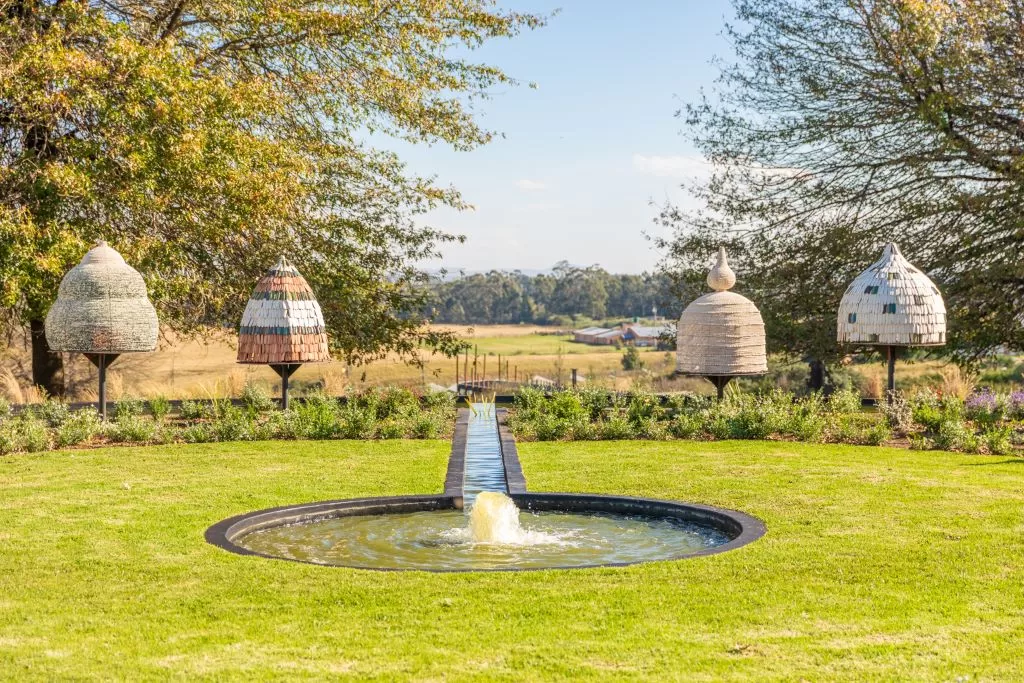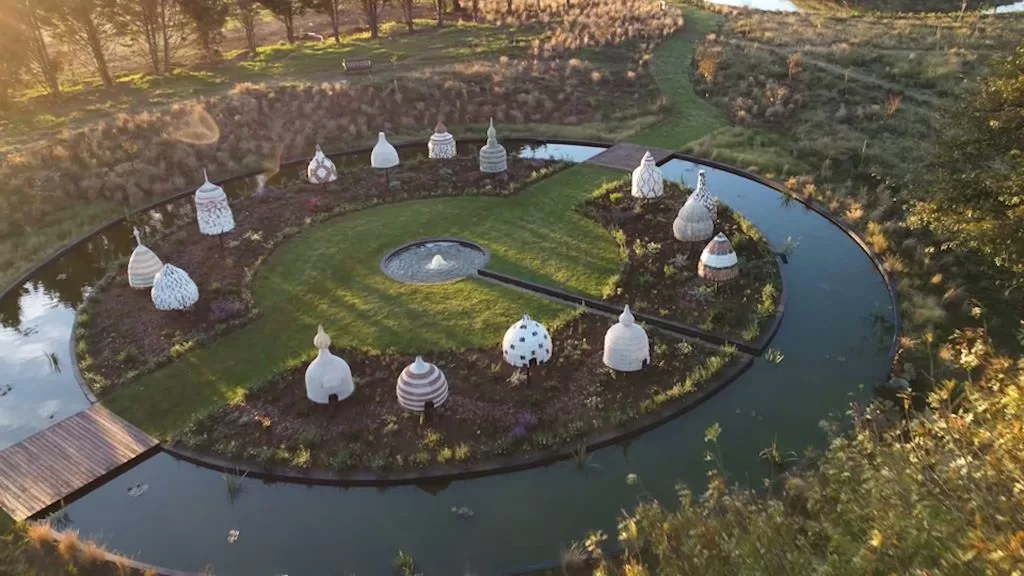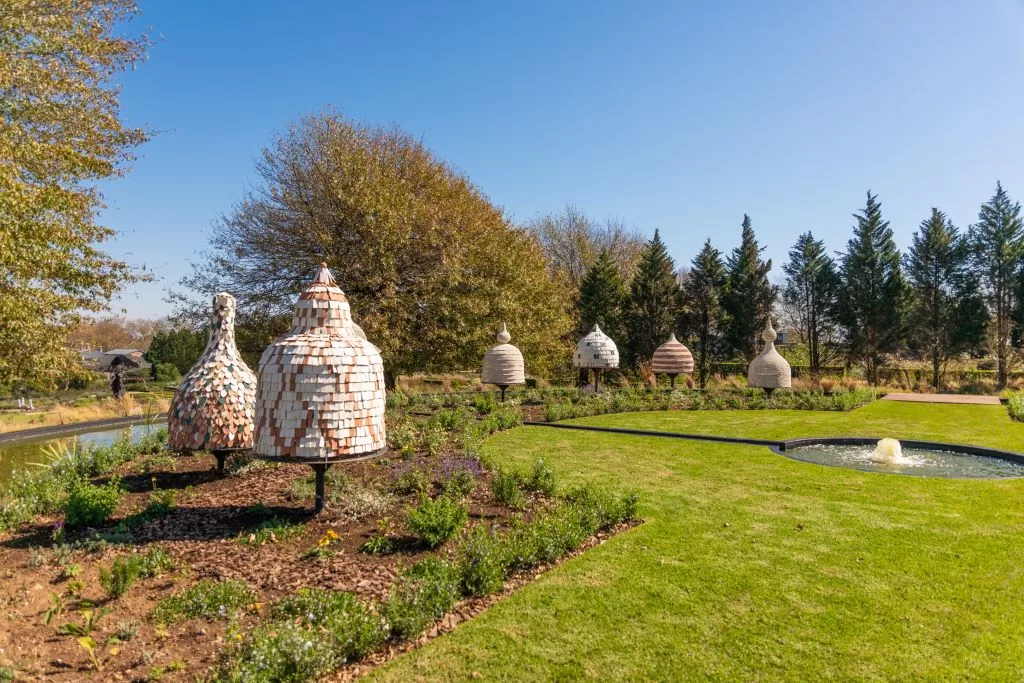Hive of Activity: Brahman Hills Creates a Buzz with Artistic Bee Homes
MIDLANDS, SOUTH AFRICA – Bees are crucial pollinators, essential for maintaining biodiversity and supporting our ecosystems. Spring heralds a critical period for bee populations. As flowers bloom, bees become increasingly active, taking advantage of the abundant nectar and pollen.

Understanding the importance of this time for bees and their role in keeping our ecosystem thriving, Brahman Hills has introduced sixteen beautifully crafted, Zulu hut-shaped structures to house their bee colonies. “As stewards of our 1000-hectare property within the Blue Crane Nature Reserve, we feel a deep responsibility to protect our smallest, yet mightiest allies – bees,” says Orrin Cottle, CEO of Brahman Hills.

He explains, “Our passion for bees is evident in our new bee kraal. Arranged in a circular pattern around a central fountain, these creative hives are more than just homes for our bees – they’re a testament to local artistry, sustainable practices, and our deep respect for our local hive heroes. Each hive honours not only the vital role of these little miracle workers in our environment but also the rich cultural heritage of our region.”

The exquisite ceramic beaded huts are the creation of Werner du Toit, head designer at Mud Studio. Werner’s design philosophy centres around appreciating the beauty in our surroundings, a principle vividly embodied in these Zulu hut-inspired bee hives.
“This project has been a delightful showcase of the South African Spirit of Innovation,” says du Toit. His bee kraal designs blend artistic vision with eco-friendly practices and local community support. Each ceramic bead was hand-rolled from recycled clay and wire-wrapped, while the leaves were individually shaped and styled around handmade frames—a process that engaged 10 community members for over three months.
As Brahman Hills unveils its artistic bee kraal, Cottle emphasises the vital importance of bees and the urgent need for their protection. He notes, “The fear of being stung often leads people to kill bees but through education, we can address and overcome this fear. Understanding their role and learning how to coexist with bees safely is far more important than any momentary discomfort. Our goal is to shift the response from fear to appreciation for these industrious, unsung creatures.”
He outlines 5 key reasons why protecting bees is essential for our collective future:
- Food Security: Along with other pollinators such as wasps and butterflies, bees pollinate approximately 75% of global crops (at least in part), including fruits, vegetables, and nuts. Without them, our food supply would be severely compromised, potentially leading to widespread shortages and nutritional deficits.
- Biodiversity: Bees support the growth of trees, flowers, and other plants, which serve as food and shelter for various creatures. Their role in maintaining diverse ecosystems is irreplaceable.
- Economic Impact: While the current exact rand value is not readily available, previous estimates suggest local bee crop pollination services contribute billions of rands to our economy annually. Many farmers and agricultural industries therefore depend on healthy bee populations for their livelihoods.
- Medical Benefits: Many medicinal plants rely on bee pollination, and honey, known for its antioxidant, antimicrobial, and anti-inflammatory properties, has been used for thousands of years. Bee venom is also being studied for its potential in treating various illnesses.
- Environmental Indicators: Bees are sensitive to environmental changes, serving as early warning systems for local ecosystem health. Their presence or absence can alert us to environmental imbalances before they become critical.
“Every action that harms bees—pesticides, habitat destruction or direct killing—has far-reaching consequences because bees truly do make our world go round,” says Cottle. “Our Brahman bees are essential to maintaining our international award-winning gardens and producing the delicious organic raw honey that graces our kitchen. That’s why we insisted that their homes should be as extraordinary as they are.”
Holidaymakers, commuters and passersby are welcome to experience the beauty and significance of the Brahman Hills bee kraal firsthand. “You’ll have the opportunity to see these extraordinary hives up close, set against the backdrop of the stunning Kwa-Zulu Natal Midlands, and witness the delicate balance between nature and human ingenuity,” he concludes.


























